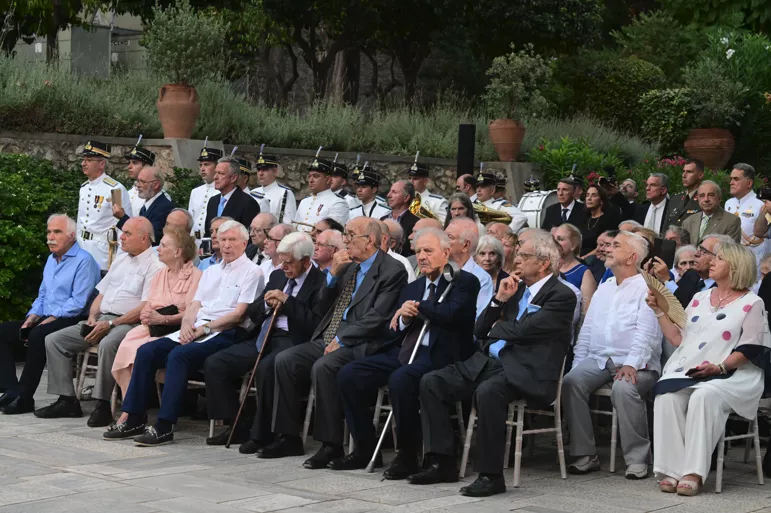The prime minister Kyriakos Mitsotakisthe leaders of the parties and many other guests were welcomed by the President of the Republic, the President of the Republic, Konstantinos Tasoulas.
In his speech the President of the Republic stressed:
“We are here today to honor the birthday of the 3rd Hellenic Republic. We also honor with deep respect for all the citizens who resisted the darkness of dictatorship and fought for the return to democratic legitimacy, even sacrificing their lives. July 24th is a historical turning point in the course of Hellenism as it marks the consolidation of democratic institutions and a milestone for the full integration of the country into the core of the democratic and developed world. A process that culminated in Greece’s introduction to European communities just years after the restoration of democracy. These successes, which are perhaps the most vital, the most fundamental conquests of modern Hellenism, have the stamp of a flagship leader, Constantine Karamanlis.
Like any other important anniversary, the 51 years this year has been remedied by the restoration of democracy, give us the opportunity not only to remember the historical events but also to evaluate their importance in today, that is, to reflect on the constant dialogue between the past and the present. This mental exercise is not only important for pumping – always useful – lessons from historical experience but also for understanding today’s challenges and dealing with them. Challenges that are constantly multiplying in a time of increasing instability and uncertainty, such as climate crisis, international economic instability and the intensity of geopolitical pressures our country is facing in its wider region.
The tragic seven -year dictatorship was not only a constitutional diversion but a multifaceted regression for the country. It has jeopardized its historical orientation and social cohesion while at the international level it led Greece to international disrepair and isolation. The collapse of the military regime eventually came as a result of the junta’s unprofessional policy on the Cyprus issue. The invasion of the Turkish army on the island led to the illegal occupation of 37% of the Cypriot territory. The festive atmosphere of today’s event should not obscure the fact that the Cyprus issue remains an open wound and Nicosia the last divided capital of Europe. The whole of Hellenism continues to stand decisively on the side of Cyprus until the final justification of the struggle, for which it is a prerequisite for the withdrawal of the occupation troops from the island.
When Konstantinos Karamanlis returned to Greece on the night of July 23, 1974 to Greece with the aircraft of French President Valerie D’Astin, in a historic moment of July 23, 1974, he gathered all the hopes of the Greek people on his face. And indeed, Karamanlis did not suffice in the short -term management of the challenges of the moment, but consciously sought the definitive resolution of all the problems that have plagued the Greek political system for decades. Long -term targeting and construction of stable and functional institutions was a key feature of Karamanlis’ strategy. And this was because it undertook not only to carry out the difficult task of moving to democracy but also the management of a national crisis in Cyprus.
The pace of developments has been stormy. Immediate abolition of the non -existent “constitutional arrangements” of the dictatorial regime return of the army to its institutional role with its complete control of political leadership. Legalization of the parties, including the Communist Party, which was outlawed since the Civil War. The exemplary November 1974 elections completed the first and most difficult phase of the democratic transition. Immediately afterwards, the state -of -the -art referendum of December 1974 is resolved in a clear and undisputed way the state issue in favor of the indefinite democracy. In June 1975, the most complete, modern and democratic constitution was voted on in Greek constitutional history. The 1975 Constitution was adequately taken into account the peculiarities of Greek reality, predicted the strengthening of executive power as a means of overcoming the impasses of the past and formulated a comprehensive regulatory framework for adapting the Greek legal order to the European regulation. The 1975 Constitution proved to be the longest -serving charter of the modern Greek state and despite the challenges, which it has successfully overcome, remains the basis of our democratic state.
Along with the reconstitution of democratic institutions inside, the Karamanlis governments have decisively shielded the new state based on two pillars. One was the reorganization of the army, whose operational capacity had been seriously undermined by the malevolent of the junta – unmistakable witness, the tragic recruitment of July 1974. The defendance of the country’s independence and the safeguarding of its disproportionate capacity – Institutions. The second pillar was the strategic decision to access European communities, which must be seen as a constituent part of its democratic transition itself. As a member of the United Europe since 1981, Greece would have an additional guarantee of its democratic government, strengthen its safety and ensure its social and economic development. Also basic conditions for the political stabilization of the country and the consolidation of its position in the Western world.
The success and speed of the Greek transition to the Republic have surprised even the most optimistic observers. A key component of success was Constantine Karamanlis’ insistence on the unity of the inner front, the cultivation of a mild political climate and in avoiding tensions that have characterized Greek political history over time. A possible revival of old political conflicts could also derail the entire venture of democratization. The postwar regime, in the narrow sense of democratic transition, is a compass for the future and a national legacy. It showed that with the National Front Front, and with the necessary political will to overcome the impasses of the past, Greece has managed to change the page and leave behind a long period of institutional crisis and uncertainty.
We are now in the second fifty years of life of the Third Hellenic Republic, and the institutional framework set up in 1974-5 has proven its resilience. The strategic decisions taken at that time on the country’s international position were the same and national benefit. The successive crises of recent years and the political acidity that unfortunately continues to characterize in many cases our political life have failed to seriously shake the post -political building. So let us keep it as steadfast so that with unity in the great and the great ones that must unite us, stability in domestic and international reputation, we can overcome the complexes that stand in front of us every time. “
Speaking to reporters, Costas Tasoulas revealed that he raised the issue of characterizations used in political discourse, stressing that they often go beyond the limits.
“We talked about the use of some expressions that sometimes go beyond some limits. I opened the issue because I was asked by your colleagues if I would play the role of blue. There was a debate on the tension and expressions that sometimes go beyond the limits. There was no embarrassment. The amazing appetizers also helped. This year we made them here in the kitchen. This debate does not end up somewhere because no one admits that it does. “
Referring to the absences, the President of the Republic said: “Where do you call you? Some don’t go. And sometimes some were missing. “
See photos from the event:
Source: Skai
I have worked in the news industry for over 10 years. I have been an author at News Bulletin 247 for the past 2 years. I mostly cover politics news. I am a highly experienced and respected journalist. I have won numerous awards for my work.


















